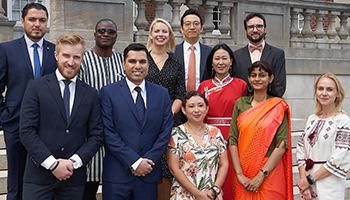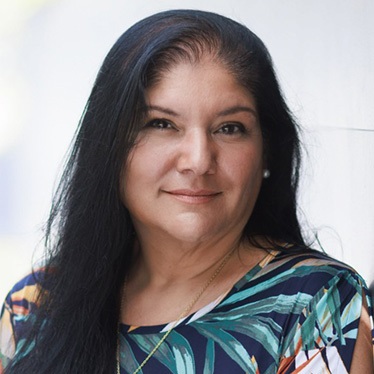Every Corner of the Globe
January 10, 2020
Humphrey Fellows learn American-style civic spirit and how to apply it at home.
Nimrod Goren recently traveled from Israel to Washington, D.C., to speak about Israeli domestic and foreign policy at the J Street National Conference and at the Center for American Progress. Goren is the founder and head of Mitvim: The Israeli Institute for Regional Foreign Policies, which evolved in 2011 from his work promoting Israeli-Palestinian peace and regional dialogue.

He’ll tell you it also evolved from his work as a Hubert H. Humphrey Fellow at the Maxwell School. Goren was one of 11 fellows at Maxwell during the School’s first year hosting the program, 2009-10, sponsored and funded by the U.S. Department of State. He joined midcareer professionals from nine other countries for graduate study, professional development, and cultural exchange, and through that experience increased his understanding of U.S. government and foreign policy. He also learned international perspectives from other fellows in the program. He then worked for J Street, and thereafter founded Mitvim. His recent speech at J Street was a return visit to his former employer.
Mitvim “directly continues the issues I studied at Maxwell,” he says. “The Humphrey year enabled me to turn an idea into action.”
This year is the 11th that Maxwell has been selected by State to host Humphrey Fellows. Participants this year hail from Belarus, Brazil, Burkina Faso, India, Latvia, Panama, Pakistan, Russia, South Korea, and Tunisia. They bring diverse professional backgrounds: government, business, and academia; and expertise in finance, technology, planning, defense, and publishing.
“The Humphrey year enabled me to turn an idea into action.”
Nimrod Goren
The Hubert H. Humphrey Fellowship Program was started in 1978 to honor the former vice president’s commitment to international cooperation and public service. Each year, 150 midcareer professionals from emerging democracies take part. Maxwell is one of only 13 colleges selected by the State Department to provide hosting and teaching.
Fellows engage with students and faculty, creating individualized programs that draw from the School’s 10 institutes and research centers. Maxwell’s international and interdisciplinary ethos provides a diverse, collaborative experience that nurtures discussion of global issues.
Fellows also interact with the off-campus community, sharing their experience with civic and charitable organizations. In this year’s cohort, for example, Hanna Yahorava of Belarus visited Cicero-North Syracuse High School for a talk on women in political leadership. Barbara Barrios Dumanoir of Panama participated in mediation training sponsored by New Justice Conflict Resolution Services, a Syracuse nonprofit. A handful of fellows give talks through Maxwell’s Peer to Peer program.
“Humphrey Fellows have energized the Maxwell School with an abundance of professional experience and a rich array of global perspectives,” says Steve Lux, director of executive education programs, which administers the program. “They are an invaluable part of who we are as an institution.”
The program stresses leadership, linking theory with practice in a manner that fellows can implement when they return home. They build lasting relationships within their cohort, and with faculty, professional affiliation hosts, and host families in Syracuse.

The resulting connections are often cultural. Back home in southern Siberia, Kherel Naksyl works in finance for the Republic of Tuva. As a current Humphrey Fellow, she has worked at the nearby Skä•noñh heritage center, which celebrates the history and culture of the Haudenosaunee nation of Native Americans. She identifies with the Haudenosaunee’s relationship with nature.
She hopes to apply managerial leadership practices and economic policy knowledge when she returns to Russia; and hopes that soft skills the program develops—teamwork, communication, problem-solving—will boost her career.
Nimrod Goren’s Humphrey year certainly accomplished that. The fellowship, he says, “enabled me to reflect on the needs of my country, to explore ways to improve Israel’s foreign policy, and make an impact.”
By Renée K. Gadoua
This article appeared in the fall 2019 print edition of Maxwell Perspective © Maxwell School of Syracuse University. To request a copy, e-mail maxwellperspective@syr.edu.
Related News
School News

Dec 19, 2024
School News

Dec 11, 2024
School News

Dec 10, 2024
